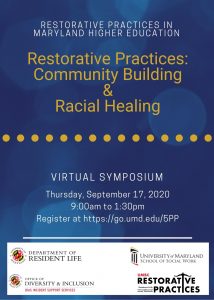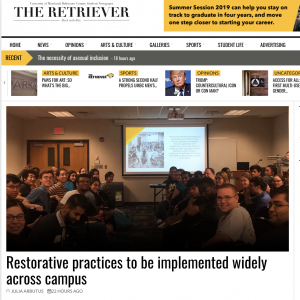Restorative practices is a philosophy and a set of formal and informal tools which view building relationships, repairing harm, and rebuilding trust when harm occurs as important ways to create a peaceful and productive society. At UMBC, restorative practices helps us strengthen relationships between individuals as well as social connections within our community. The International Institute for Restorative Practices (IIRP) describes the outcomes of restorative practices implementation in communities and education settings as increased well-being, active and participatory learning, community building, decision-making, greater safety, and sense of belonging.
More information and current research about restorative practices can be found on the IIRP website. We recommend starting by reading Defining Restorative.
In Residential Life at UMBC, Restorative Practices is used by staff and students as a proactive way to build community and a responsive way to resolve conflict. For example, resident advisors use restorative tools, such as community-standard-setting circles, to build community and create ownership among residents.
When conflict occurs, Residential Life and Student Conduct and Community Standards support staff and students in engaging the restorative tools to resolve issues in a way that repairs harm and rebuilds trust.
All restorative practices rely on specific methods to encourage dialogue especially when harm has occurred, regardless of the restorative model used. For example, the questions below help stakeholders determine impact, repair harm, and hopefully re-establish relationships.
- What happened?
- What were you thinking at the time of the incident?
- What have you thought about since?
- Who has been affected by what happened and how?
- What about this has been the hardest for you?
- What do you think needs to be done to make things as right as possible?
Residential Life cultivates the capacity for community members to use restorative tools by incorporating restorative practices into our residential education plan, and training student leaders and student organizations on using restorative tools, and restorative leadership.
For more on restorative practices in our community check out these blog posts written by a UMBC student leader.
Events & Workshops
In The News

